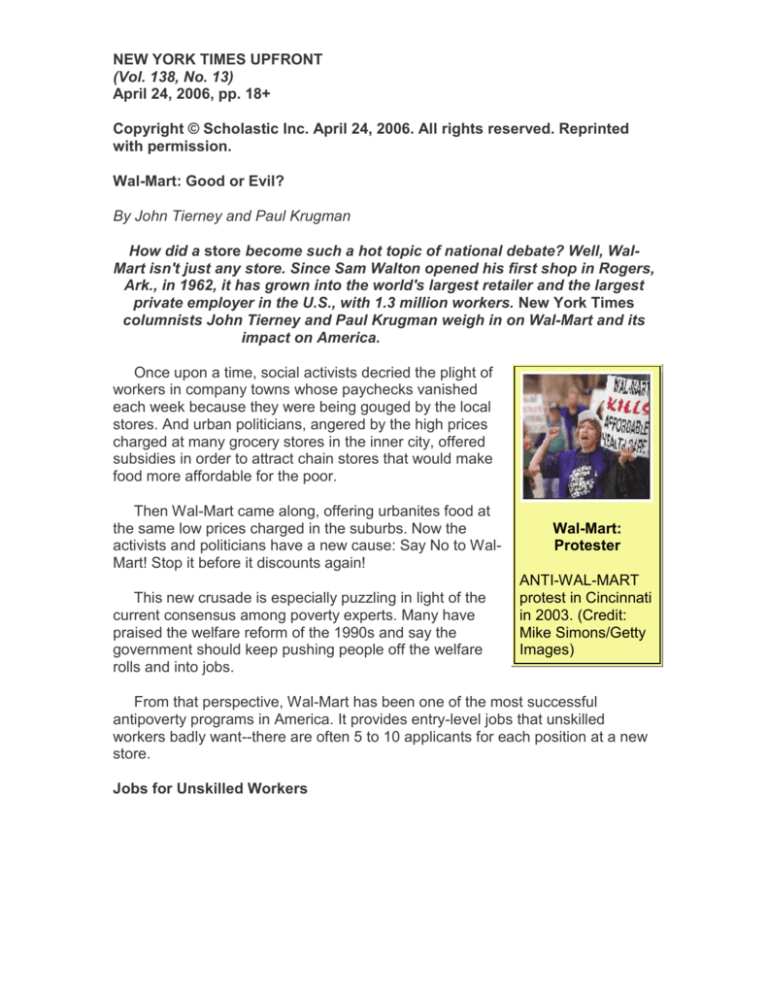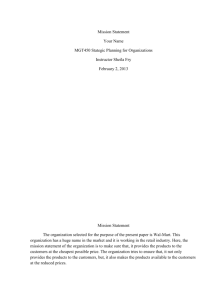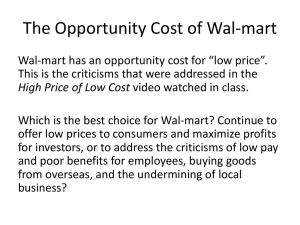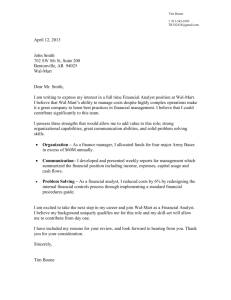
NEW YORK TIMES UPFRONT
(Vol. 138, No. 13)
April 24, 2006, pp. 18+
Copyright © Scholastic Inc. April 24, 2006. All rights reserved. Reprinted
with permission.
Wal-Mart: Good or Evil?
By John Tierney and Paul Krugman
How did a store become such a hot topic of national debate? Well, WalMart isn't just any store. Since Sam Walton opened his first shop in Rogers,
Ark., in 1962, it has grown into the world's largest retailer and the largest
private employer in the U.S., with 1.3 million workers. New York Times
columnists John Tierney and Paul Krugman weigh in on Wal-Mart and its
impact on America.
Once upon a time, social activists decried the plight of
workers in company towns whose paychecks vanished
each week because they were being gouged by the local
stores. And urban politicians, angered by the high prices
charged at many grocery stores in the inner city, offered
subsidies in order to attract chain stores that would make
food more affordable for the poor.
Then Wal-Mart came along, offering urbanites food at
the same low prices charged in the suburbs. Now the
activists and politicians have a new cause: Say No to WalMart! Stop it before it discounts again!
This new crusade is especially puzzling in light of the
current consensus among poverty experts. Many have
praised the welfare reform of the 1990s and say the
government should keep pushing people off the welfare
rolls and into jobs.
Wal-Mart:
Protester
ANTI-WAL-MART
protest in Cincinnati
in 2003. (Credit:
Mike Simons/Getty
Images)
From that perspective, Wal-Mart has been one of the most successful
antipoverty programs in America. It provides entry-level jobs that unskilled
workers badly want--there are often 5 to 10 applicants for each position at a new
store.
Jobs for Unskilled Workers
Wal-Mart: Register
Screen
2005 SALES: $312
billion (Credit: James
Leynse/Corbis)
Critics say Wal-Mart's pay, $9.68 per hour on
average, is too low and depresses local retail wages
when a new store opens. That effect is debatable, but
even if wages do go down slightly, these workers still
end up with more disposable income, according to Jason
Furman, a professor at New York University and former
economic adviser in the Clinton administration who
studies Wal-Mart.
Furman notes that the possible decline in wages is
minuscule compared with what the typical family saves
by shopping at Wal-Mart: nearly $800 per year on
groceries alone, a savings that's especially valuable to
the many low-income shoppers at Wal-Mart.
An Easy Target
The average income of Wal-Mart shoppers is $35,000, compared with
$50,000 for Target and $74,000 for Costco. Costco is touted as the virtuous
alternative to Wal-Mart because it pays better wages, but it needs to do so
because it requires higher-skilled workers to sell higher-end products to its more
affluent customers.
Wal-Mart is often denounced for getting "corporate
welfare" because some of its employees rely on
Medicaid for health care and on other government aid.
But so do some employees at other companies or at
government institutions like public schools. Wal-Mart
offers health benefits that are generally comparable to
what other big retailers offer.
Wal-Mart's size makes it an easy target for enemies,
like the Maryland legislators who passed a bill in January
that would apparently affect only one company in the
state: Wal-Mart. The legislators in Maryland (and other
states considering similar proposals) want to force WalMart to either increase its spending on health-care
benefits or to make payments to the state's health
program for the poor.
Kennedy, Ted:
Senator
SEN. KENNEDY (DMass.) speaks about
corporate health-care
policies last June.
(Credit: Yuri
Gripas/Corbis)
Making Shoppers Pay
But suppose Wal-Mart were forced to give health coverage to all of its parttime employees. To remain competitive, Wal-Mart would probably cut the cash
wages of the workers to compensate for the additional health benefits. The cut in
take-home pay would be particularly hard on the many part-timers who don't
need the benefits because they're already covered through their spouses' or
other insurance.
Some of Wal-Mart's critics prefer to imagine that Wal-Mart wouldn't have to
cut wages--that it could get away with raising prices a little to cover the extra
health-care expenses. But higher prices would make Wal-Mart's shoppers bear
the cost: Wal-Mart's low-income customers would, in effect, be paying a
regressive new sales tax to pay for the employees' added health benefits.
It's easy to understand the motives of some of Wal-Mart's enemies. Local
merchants don't want to match its prices. Labor leaders know that they'll lose
members and dues if unionized stores suffer. But why would anyone who claims
to be fighting for social justice be so determined to take money out of the pockets
of the poor?--John Tierney
John Tierney is a columnist on the Op-Ed page of The New York Times.
***
Wal-Mart recently responded to some of its critics with one of the worst
economic arguments of the last year.
A union-backed group critical of the company, Wake Up Wal-Mart, released a
TV ad in December accusing Wal-Mart of violating religious values. The ad was
backed by a letter from religious leaders attacking the retail giant for paying low
wages and offering poor benefits. The letter declares that "Jesus would not
embrace Wal-Mart's values of greed and profits at any cost."
You may think that this particular advertising campaign--which has inevitably
been dubbed "Where would Jesus shop?"--is a bit over the top. But it's clear why
those concerned about the state of American workers are focusing their criticism
on Wal-Mart.
Low Pay, Few Benefits
Wal-Mart isn't just America's largest private employer. It's also a symbol of the
state of our economy, which is growing even as living standards for average
working Americans fall or remain stagnant. And Wal-Mart is a huge, and hugely
profitable, company that pays badly and offers minimal benefits.
Attacks on Wal-Mart have hurt its image, and perhaps even its business. The
company has set up a campaign-style war room to devise responses. So how did
Wal-Mart respond to this recent religious-values critique?
Wal-Mart can claim, with considerable justice, that its business practices
make America as a whole richer. The fact is that Wal-Mart sells many products
more cheaply than traditional stores, and that its low prices aren't solely or even
mainly the result of the low wages it pays: Wal-Mart has been able to reduce
prices largely because it has brought genuine technological and organizational
innovation to the retail business.
It's harder for Wal-Mart to defend its pay and benefits policies. The company
could try to argue that despite its awesome size and market dominance, it cannot
defy the laws of supply and demand, and therefore is forced to pay low wages
(though I would disagree).
But instead, Wal-Mart decided to insult our intelligence by claiming to be, of all
things, an engine of job creation. Judging from its response to the religiousvalues campaign, the assertion that Wal-Mart "creates 100,000 jobs a year" is
now the core of the company's public-relations strategy.
Creating Jobs?
It's true that the company is getting bigger every year. But adding 100,000
people to Wal-Mart's workforce does not mean adding 100,000 jobs to the
economy. On the contrary, there's every reason to believe that as Wal-Mart
expands, it destroys at least as many jobs as it creates, and drives down
workers' wages in the process.
Think about what happens when Wal-Mart opens a store in a previously
untouched city or county. The new store takes sales away from stores that are
already in the area; these stores lay off workers or even go out of business.
When Wal-Mart Comes to Town
Because Wal-Mart's stores employ fewer workers per dollar of sales than the
smaller stores they replace, overall retail employment surely goes down, not up,
when Wal-Mart comes to town. And if the jobs lost come from employers who
pay more than Wal-Mart does, overall wages will fall.
This isn't just speculation on my part. A recent study used sophisticated
statistical analysis to estimate the effects on jobs and wages as Wal-Mart spread
out from its original center in Arkansas. The authors found that retail employment
did, indeed, fall when Wal-Mart arrived in a new county. It's not clear whether
overall employment rose or fell when a Wal-Mart store opened. But it's clear that
average wages fell.
So Wal-Mart has chosen to defend itself with a really poor argument. If that's
the best the company can come up with, it's going to keep losing the publicrelations war with its critics. Maybe it should consider an alternative strategy,
such as paying higher wages.--Paul Krugman
Paul Krugman is a columnist on the Op-Ed page of The New York Times.
Background
For 19 million customers worldwide who shop at Wal-Mart each day, it is a
haven for low prices. But critics of Wal-Mart say it pays its workers too little and
drives competitors out of business. Two New York Times columnists, John
Tierney and Paul Krugman, discuss some of the arguments for and against the
giant retailer.




